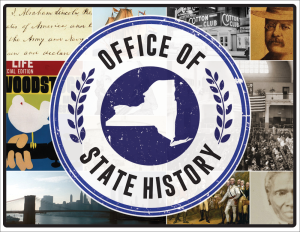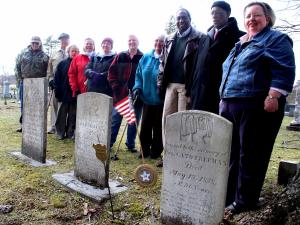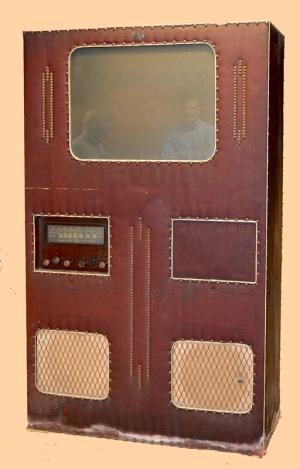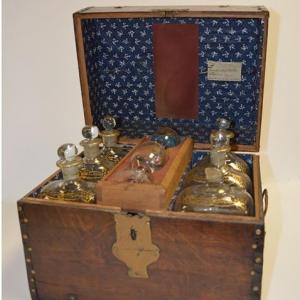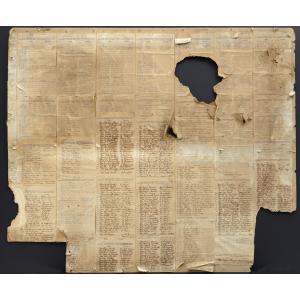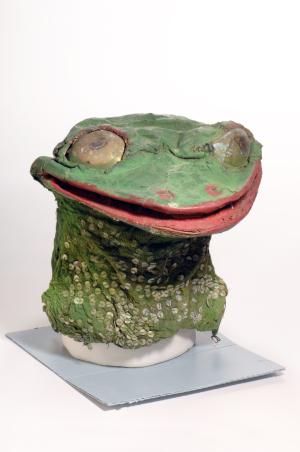News Article
The Value of History
Published October 27, 2016 | State History
The History Relevance Campaign’s Values of History Statement presents seven ways history is essential today.
Preserving Place: An E-Publication by the National Council on Public History
Published October 27, 2016 | State History
In commemoration of the 1966 National Historic Preservation Act, The Public Historian and NCPH have released a free e-publication which reflects on the legislation. It includes various essays from NCPH’s History@Work blog for consultation, study, ...
Elevating History: How Local Government Historians Help to Sustain Communities
Published October 18, 2016 | State History
This article appeared in the Summer 2016 New York State Conference of Mayors & Municipal Officers Municipal Bulletin. New York is unique among the 50 states when it comes to its history. This is true not just because of the myriad nat...
The 2016 Empire State Archives and History Award
Published October 17, 2016 | State History
Please join the Archives Partnership Trust for a fascinating evening with American author, historian, Pulitzer Prize-winner and National Humanities Medalist, Ron Chernow and nationally prominent Lincoln Scholar Harold Holzer as they talk about Mr....
Researching New York
Published October 17, 2016 | State History
Celebrate New York History Month at the annual Researching New York Conference! The conference meets annually in November, bringing together historians, archivists, public historians, graduate students, museum curators, teachers, documentarians, a...
Cato Freedom Historical Marker Unveiling Planned for May, 2017
Published October 13, 2016 | State History
Content by Deb Mackenzie On May 20th, 2017, at 1 p.m. an ad hoc group, spear-headed by the Otsego County Historical Association, will unveil a historical marker commemorating Cato Freedom. The group is a collaboration between t...
Greater Hudson Heritage Network Announces Winners of the 2016 Awards of Excellence
Published October 13, 2016 | State History
Greater Hudson Heritage Network's Awards for Excellence program seeks to recognize and commend exceptional efforts among GHHN members. Awards are made to projects that exemplify creativity and professional vision resulting in a contribut...
National Park Service Announces LGBTQ Themed Study
Published October 12, 2016 | State History
The National Park Service has announced a new study called “LGBTQ America” which explores underrepresented lesbian, gay, bisexual, transgender, and queer histories in the United States. Each chapter of the series provides an expert summary of vari...
Cayuga Heights History Project Receives National Award of Merit
Published October 11, 2016 | State History
The Cayuga Heights History Project is a volunteer group that collects and interprets the history of the Village of Cayuga Heights, a university suburb adjacent to the campus of Cornell University in Ithaca, New York. With a shoestring budget, proj...
Civil War Nurses Memorial Honors Local Women and Others Who Served
Published October 11, 2016 | State History
The Civil War Nurses Memorial was dedicated September 28th at Tompkins Cortland Community College, culminating a project initiated by the Tompkins County Civil War Sesquicentennial Commemoration Commission. This report is authored by Tompkins Cou...
"Everybody has a story. Tell it." : The Cayuga Heights History Project
Published October 11, 2016 | State History
The Cayuga Heights History Project is a volunteer group that collects and interprets the history of the Village of Cayuga Heights, a university suburb adjacent to the campus of Cornell University in Ithaca, New York. With a shoestring budget, proj...
AASLH Call for Papers!
Published October 6, 2016 | State History
American Association for State and Local History
MANY LENSES: Three museums, three objects, many lenses
Published September 30, 2016 | State History
National Museum of African American History & Culture
A New Culture Of Cooperation In Academia Is Emerging
Published September 30, 2016 | State History
NPR
Review: The Smithsonian African American Museum Is Here at Last. And It Uplifts and Upsets.
Published September 30, 2016 | State History
New York Times
Placing Family History in Context: A Personal Example & Ideas for Museums
Published September 30, 2016 | State History
American Association for State and Local History
New Acquisition: 1947 Tavern Television
Published August 4, 2016 | Social History
The State Museum recently acquired a fully-restored 1947 Tavern Television made by the United States Television Manufacturing Corporation (USTMC). Made in New York City, this unit is believed to be one of only five known sets left in the United St...
New Acquisition: Liquor Chest Used by NYS Soldiers in American Revolution and War of 1812
Published February 29, 2016 | Political History
A liquor chest used by soldiers in the American Revolution and the War of 1812 was recently donated to the New York State Museum. The chest was donated by the descendants of Captain Abraham Swartwout (an officer on General George Washington...
Museum Adds 1917 Women's Suffrage Petitions to Collection
Published June 26, 2015 | Social History
The Museum recently acquired a series of 1917 Franklin County women's suffrage petitions from Jean Kubaryk, a teacher at North Warren Central School District. Ms. Kubaryk had been displaying the petitions in her classroom for years, but ...
Human Frogs in the History Collections!
Published December 9, 2013 | Cultural History
The New York State Museum’s history collections contain two frog costumes for humans and one frog costume for a dog. These costumes belonged to Harry and Friede DeMarlo, a vaudeville couple that once played circuses and vaudeville houses all over ...



